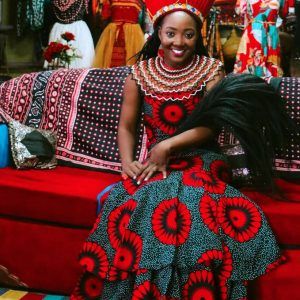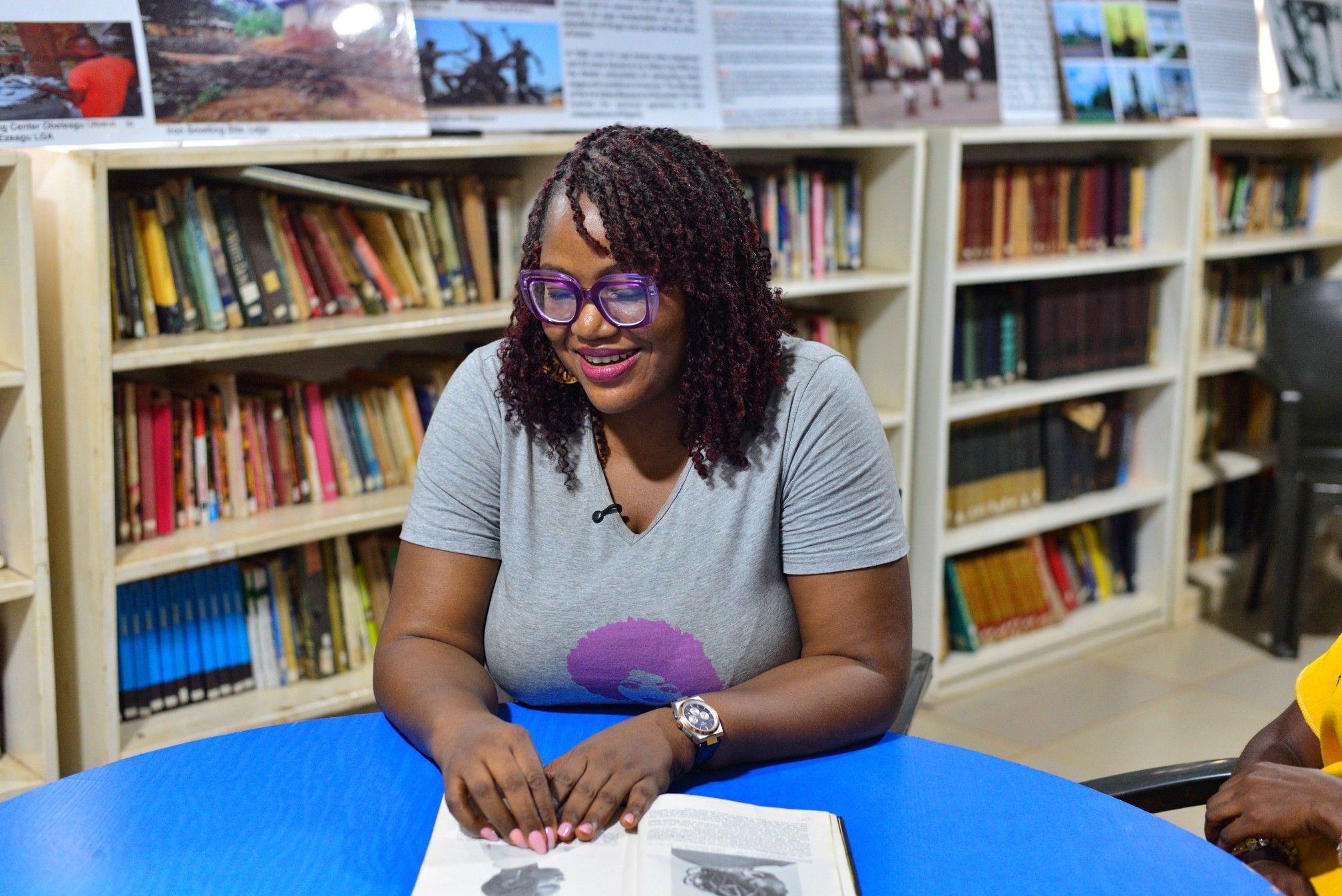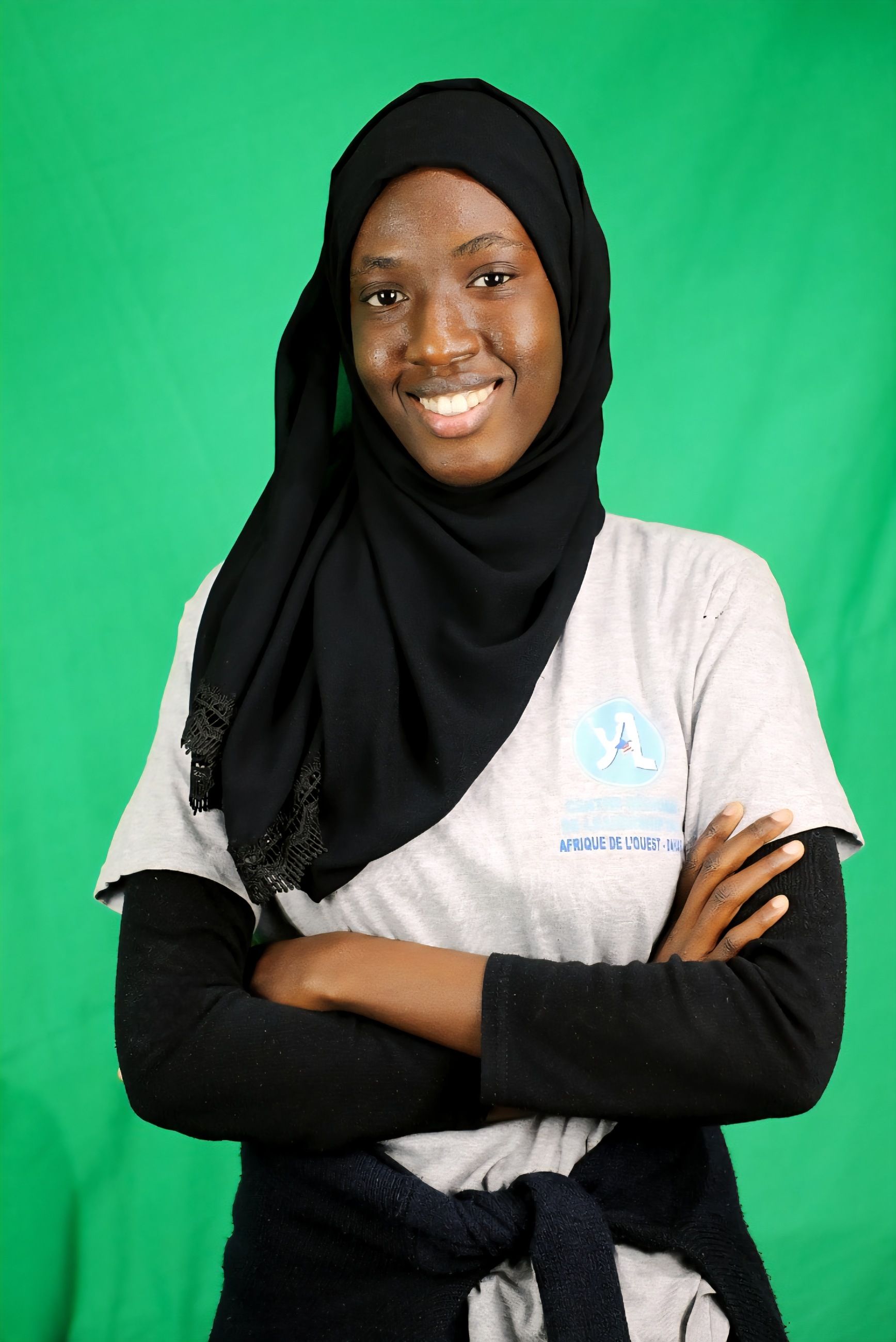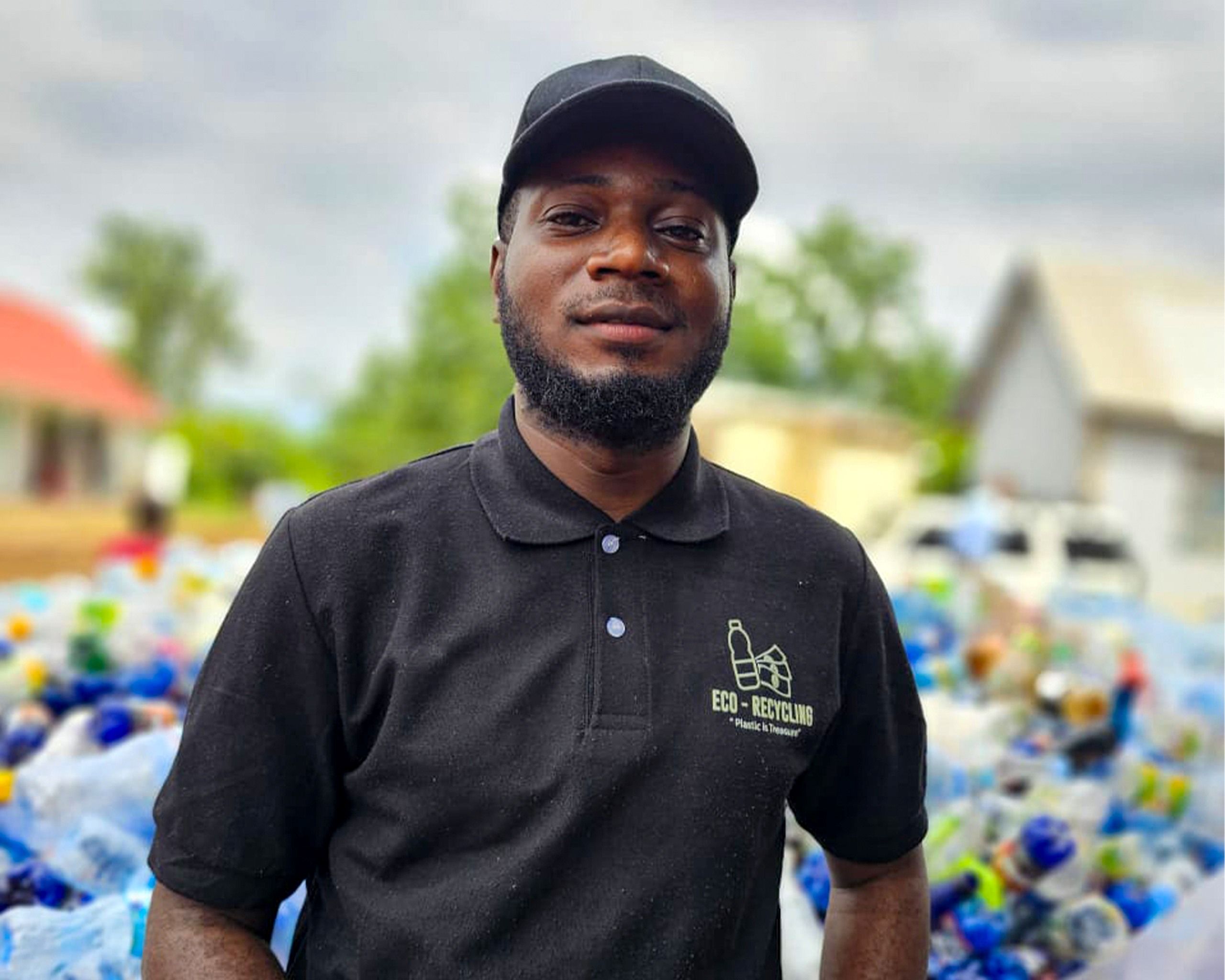A childhood love for her cultural attire helped spark Edna Dhahabu Karisa's fashion dream and her label, Mijikenda. Then, she started blending local influences with others from Nigeria, South Africa, Ghana and Tanzania. And she's just getting started.

By Atieno Odera, bird story agency
Lush green vegetation is dwarfed by palm trees that seem to be trying to resist the wind as they sway high above a strip of shops in Mazeras town on the Kenyan coast.
The drive to the town – usually around 30 minutes from Mombasa – has taken double that thanks to a flat tyre. Yet, host Edna Dhahabu Karisa seems unfazed as she welcomes her visitors at the Mkapuni shopping centre in the tiny town, one of the scores along the Kenyan coast. Thanks to Karisa, Mazeras town is becoming known across the continent and beyond.
Karisa, 27 and a rising star in African design, stands in front of a colourful display of 'handos' and 'kisitu' (the traditional skirts and complimentary tops of the Mijikenda, a group of nine related ethnic groups known as "The Nine Tribes" who inhabit the coastal region). Welcoming her visitors with the Swahili courtesy of 'karibu' (welcome), she ushers them into her 'maskan', her workshop-cum-shop, which she calls The Hub Fashionista.
Inside the hub, one is hit by the smell of a new fabric, thanks to a forest of colourful clothes from many corners of Africa. On a modest table in Dhahabu’s office, tea and a plateful of 'mahamri' and 'viazi karai' – traditional bitings – are placed for visitors.
Hanging on the walls around the room are samples of Karisa's work – a diverse and culturally-blended African fashion line cut from traditional cloths, together with accessories for men, women and children.
How the business came to life
While Karisa is the name inherited from her father, most of her clients know her by Dhahabu, which means 'gold' in Swahili. She seems to have struck gold in her dressmaking career.
Karisa's journey to realising a childhood dream began in 2015 when she was hired at a local salon in Mazeras. Though, it was not until 2018, with the opening of her own little tailoring shop, that her future began to crystallise.
Among the Mijikenda, young women were traditionally taught dress and bead-making by their mothers and grandmothers. Though she lacked formal training in dress and bead-making, Karisa said she was taught to make handos at an early age. At that age, she was very aware of the beautiful traditional dresses woven with beads that were made by her mother and grandmother.
“I love fashion, and I am very passionate about the different cultural aspects of it. While I might have come into it fully as an adult, it has always been with me since I was a little girl. I loved my traditional dresses and would wear them anywhere. At the time, the attire was highly assumed to be just a ‘nguo ya nyumbani’ (clothes to be worn in the comfort of the house),” she said.
Employment at the salon allowed Karisa to save money to start her fashion business.
"I also took more interest in perfecting the generational skills of bead-making passed down from older community members so that when I had saved enough money, I would start without a hitch,” she said.
“Even when I got the salon job as a beautician, employed by a close friend, I would wear official clothes to work but at home, I always went back to my handos and kisutu.”
In her fourth month – April 2017 – at work, Karisa decided to break with the norm by wearing her traditional Mijikenda dress to work instead of the official attire.
Though she was not sure of her boss’ reaction, she decided to showcase her "love for cultural Mijikenda culture by wearing the colour and beaded dress". The decision made her an instant local celebrity and point of reference.
“I remember clearly the first time I wore my traditional attire with accessories I had made to the town centre where the salon was located. When people saw me, they started taking photos of me from the bus stage saying how beautiful my dress was,” she recalled.
“I was both excited and nervous but it was clear that they loved it. This is who we are and this is our dress. When I got to the salon, a lot of customers were complimenting me. Some wanted to know where I bought my outfit, and that is how the business came into life. I started creating the accessories and attires and bringing them to the salon for customers. I also started posting them on my Facebook to create more traffic.”
The growth journey
In 2018, she decided to open her own salon with Sh 100, 000 (US$1,000) she had in savings. Ksh 50,000 went into rent payment and the other Ksh 50,000 went into buying the materials she needed.
Initially, she focused on being a beautician and did dressing making on the side. With the income and her client base increasing, her side hustle grew fast as she built local and international networks mainly through Facebook.
To launch herself, in May 2020, Karisa made the bold move of partnering with an online TV channel to showcase products blended from various African designs to a wider audience. It paid off. The response was phenomenal.
“I held an event at RockVilla Mazeras in partnership with Fontec Online TV dubbed 'Valentine's Special'. My intention was to officially showcase my collections from Ghana, Nigeria, South Africa, Tanzania and Kenya’s Maasai and Mijikenda,” she explained.
“This was important because many of my clients were only familiar with my Mijikenda attire and accessories. They were surprised and excited to know that I had such diverse designs. After the event, I got enquiries and orders, both local and international. I also started getting calls to be the official stylist at major events such as weddings and birthdays. And even orders which demanded I travel to different counties.”
A major turning point
With business growing, Karisa hired more tailors and dressmakers and worked round the clock to meet the growing demand for her products.
Among her first high-profile clients was local celebrity Caroline Lewa, who had been impressed by Karisa's collections.
“I was able to make Mijikenda attires with accessories for her traditional wedding, which came shortly after showcasing my products,” Karisa said.
Lewa, who got to know about Karisa's unique products through Facebook, said she was impressed by her work. Karisa was the answer to the traditional Mijikenda clothing she had been dreaming of for her wedding.
“I came to know Edna Dhahabu through Facebook. I saw what she was doing. It was in March and my wedding was to take place in December 2021. I was so excited because I had really wanted to have an authentic Mijikenda traditional wedding and this was it. So I booked her that early, like 9 months in advance, to dress my whole team – myself, fiance, and our maids,” said Lewa.
“I wanted the attire, beads, and bakoras (traditional walking sticks) for the men, the kofias (hat) and true to her word she delivered what I wanted. I got my money's worth. She dressed us plus my four maids of honour and four guards. The day went perfectly,” she explained. Guards are men who assist the bridegroom.
Building the community
Since then, Karisa has never looked back. Her fashion business has grown exponentially. For a local coastal girl with no initial exposure beyond her village, her work and sheer determination have not only enabled her to travel widely but also develop connections across Africa and beyond.
“I have been travelling to neighbouring countries such as Tanzania, Uganda and the Democratic Republic of Congo to source materials and learn more about their designs to enable me to blend them into my designs,” said Karisa, over tea.
She has also created training and employment opportunities for many young people in the area and has become a role model for many women who now realise what is open to them if they focus and seize opportunities.
23-year-old Mathias Madumbu Tawa is one of the employees who have benefited from the unexpected opportunity of working in such a high-profile enterprise.
“I work as the assistant stylist. During the event gigs, I dress up the clients in the ordered attire and also help out with the make-up. I have grown and gained immense knowledge in fashion and design working under her, learning make-up skills, creating different accessories, decorating the venues and such together with her. Many of the young people from the community look up to us as role models, and it is very inspiring,” he said.
Creating the future of the African fashion industry
In a report by the AfDB (African Development Bank), Africa currently accounts for 1.9 per cent of the global fashion industry, estimated to be worth US$1.5 trillion. There is a growing realisation across the continent that this represents untapped potential in terms of job creation and economic development.
One of Karisa's role models is award-winning designer Folake Folarin-Coker, creator and owner at Tiffany Amber, whose designs grace New York Fashion Week.
Karisa is now keen to infuse the Aso-Ebi style from the Yoruba community in her designs. This is a uniform dress or dressing code/style that is traditionally worn by Yoruba and some other West African cultures as an indicator of cooperation, camaraderie and solidarity during ceremonies, events and festivals.
While many young African creatives have had to grapple with finding capital for their start-up costs and paying for exposure and marketing, this is slowly beginning to change with more organisations – especially chambers of commerce – in Africa stepping in to help market entrepreneurs like Karisa.
According to the Mombasa branch of Kenya's National Chamber of Commerce and Industry, the chamber is helping young entrepreneurs grow in their creativity and innovation.
“Fashion is an ever-changing industry, there are always new tastes and models. It is a dynamic sector. When we look at African fashion, there is extensive crossborder trade and as a chamber, we have helped a lot of young people to start up the business even as we constantly advocate for favourable business legislation for investment,” said Mustafa Ramadhan, chairperson of the Mombasa branch of the National Chamber of Commerce and Industry.
Karisa, for her part, has her sights firmly set on creating a "huge" fashion house specialising in blended African designs and culture. She encourages the youth already in the industry to create a network of creatives across the continent to showcase Africa’s unique culture through fashion.
“I have to keep studying and understanding the market trends and keep abreast with them. And despite the challenges of capital, I have the will to make it big,” she concluded.
bird story agency





